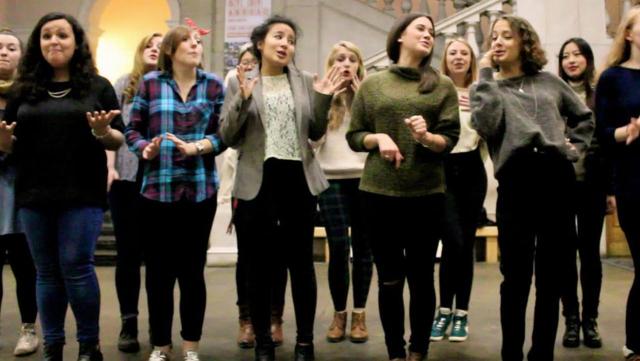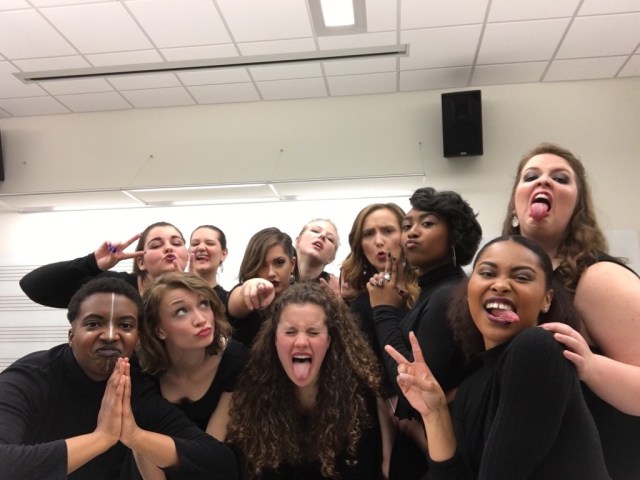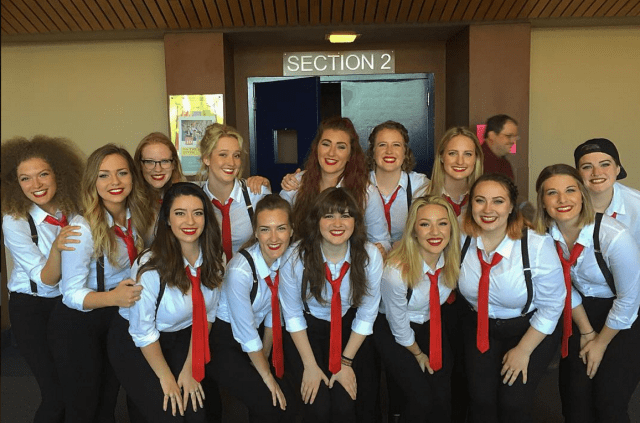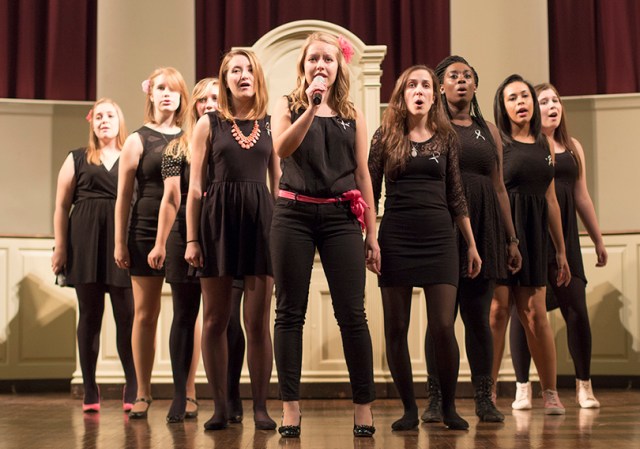We’re all on top of a mountain for A-Camp 2016! We’ll be publishing a few articles related to activities that we’re coordinating on the mountaintop so that everyone can participate (sort of). This is one of them!
This week on top of Mount Feelings, A-Campers from all over the world have the opportunity to join A-Camp’s premiere all-grrrl a cappella group The Belle Jars. We’ll be arranging a song together, learning some quick choreography, and in an hour-and-a-half, we’ll learn everything you could possibly want to know about a cappella.
Maybe you saw Pitch Perfect and fell in love with the queer possibilities of an all-woman a cappella group. Maybe you went to every single a cappella concert on your college’s campus but never felt comfortable enough to actually join one. Maybe none of those are true for you, but you’ve been wanting a way to find some like-minded friends who think singing and making noises with their mouth is cool.
My friends, it sounds like you need to start an a cappella group. Starting an a cappella group has the possibility to be one of the most fulfilling things you do. Singing is really personal and vulnerable, and making music with a group can be healing. Here are a few steps you can take to make your very own a cappella group.
1. Define what all-grrrl means to you, or choose something different altogether.
I mean, you could start a co-ed a cappella group —if that’s your jam, please go ahead. My specific experience, however, is with all-women a cappella groups, and that’s what I prefer. Sometimes “woman” doesn’t necessarily feel like the best word. Collegiate groups use “female,” but that feels a little too medical to me. I like all-grrrl because it implies that regardless of our gender identities, the one thing people will know about us is that we’re badass. The a cappella group I music directed in college recently changed its constitution to clarify who we really wanted to be. We were originally created as an all-female group, but that language started to feel not great to us. In our discussions, we decided that the group should be open to anyone who felt that they belonged in an all-female group, with no discrimination based on sex/gender assigned at birth, or your current gender. The language made the group more inclusive and allowed our group to have conversations around sexuality and gender that we’d never really had before. I think your group can be whatever you want it to be. Maybe you want a group for queer/trans women. Maybe you want a group of non-binary voices. Maybe you just want something where any and everyone who wants to sing can come and sing. All of those are perfect. Go with your heart.
2. Find some singing friends.
This is the most important step. After you know what you want for your group, find some friends who can sing. Auditioning or advertising for a group will be so much easier if you have some voices that you know can help to lead the group. It’s also way less stressful to go at this endeavor with some people you know and love than all alone!
2a. Make an executive board.
Once you’ve got your core group of friends/committed members, it’s helpful to form some sort of board. It’s easy in any sort of group formation for the person with the original idea to accidentally become the person who holds all the power. I’d suggest getting an odd number of people (for voting reasons) together who really care about the group. These people can help make important decisions, figure out how to spend any money your group may come into, and share responsibilities to help make the group more exciting for everyone involved.
3. Choose a theme for your group
Some groups still sing traditional quartet-style music. Some groups are dedicated to pop songs. Others are starting to write their own music. Most a cappella groups, however, do covers. And the range and genre are up to you. Maybe you just want to sing Joni Mitchell songs. Or maybe you want your group to have a neo-soul/Afrofuturism vibe. Maybe you only sing country music written by gay country singers. All themes are good themes, but having one is vital. It will help you to find the right people to sing with you, and will make song selection much easier.
4. Pick a name!
A cappella group names are notoriously cheesy and usually full of puns, and I for one think it’s one of the best parts of being in an a cappella group. Examples of real-life a cappella groups include Pitch Slapped, Fermata Thin Air, Queerz for Fearz, Aural Fixation, Shirley Tempos, Aca-Belles, Aca-Bellas, Ear Candy, and Treble Threat. Pick something that has to do with your theme, who your group is made up of, some music related terminology, or a pun; and if you’re still stuck, throw either “aca” on the front or “pella” on the end and you’ll be good.
5. Audition/Advertise
The choice is up to you whether you want to audition or advertise. A benefit of auditioning is that it is easier to achieve a specific sound through auditions if that’s something that’s important to you. However, with a new group, sometimes just advertising is appropriate. It’s easier to find people to join if there are fewer hurdles early on, and once the group’s more established, you can always choose to have auditions! Plus, you don’t always know what you want when you’re just starting out. Auditions too early on may leave out some awesome people. But on the flip side, choosing to let anyone in may not give you the sound you want. Both options are great. Go with your heart.
The choice is up to you whether you want to audition or advertise. A benefit of auditioning is that it is easier to achieve a specific sound through auditions if that’s something that’s important to you. However, with a new group, sometimes just advertising is appropriate. It’s easier to find people to join if there are fewer hurdles early on, and once the group’s more established, you can always choose to have auditions! Plus, you don’t always know what you want when you’re just starting out. Auditions too early on may leave out some awesome people. But on the flip side, choosing to let anyone in may not give you the sound you want. Both options are great. Go with your heart.
6. Choose some music
You’ve gotta pick some music in order to sing some music! This is where your theme comes in handy. There’s a lot to think about when you’re starting a queer all-grrrl a cappella group. What do the voices in your group sound like? Changing the key of a song is always possible, but not always easy, so it’s best to look for songs where the solo mimics the voices you have at the ready. Your music choice also represents who you are in a way. A group that exclusively sings songs written by queer women artists is going to be a different group than one that exclusively covers Taylor Swift. Both are fine! But those two groups have different goals. What are your goals for your group?
This step is important because, in a singing group, your music is why you’re there. The songs you pick will very likely speak to your members, and sometimes in really personal ways. When you’re thinking about songs to sing with your members, ask each other what the song means to you and how it makes you feel. Having an emotional connection to your music will make singing more fulfilling and your performances will be so much more enjoyable for audiences when they can tell the songs really mean something to you!

Credit: The Rolling Tones/The Rolling Tones
7. Arrange some songs!
Arranging is a process of taking a song and translating all of its parts — solos, harmonies, and instruments — into voice parts. This sounds hard, but it’s not! I promise! You don’t even need to know how to read music to arrange songs. The way that we’ll arrange songs at A-Camp is through group arranging, and it’s one of the easiest ways I know to arrange a song where the only thing necessary is the ability to listen closely.
In group arranging, you listen to the song as a group, find its important parts, and figure out how to make those parts into sounds that can come out of your mouth. A lot of a cappella is experimenting with different syllables and sounds like sound silly on their own, but in a group can transform into cool accompaniment.
This is when you really take advantage of your voices! Have your low voices focus on the bass part–and let me clear something up right now: there is no world where an all-woman/all-grrrl group of singers cannot sing bass. You have your bass section sing loud and proud, low and strong. You know how female bass players are automatically the hottest people in bands? The same thing is true of women-led bass sections in a cappella groups. Everyone loves a lady bass.
Have your sopranos (high voices), altos (middle voices), basses (low voices), and vocal percussionists sit together while you do this process. That way, if one person hears a part that they might be able to sing, but doesn’t have a fully formed idea, someone else singing the same part can help them out.
Experiment! The only way to figure out if a song will work out is to sing it. So even when its new and sounds wonky, still try it. It’ll only get better, the more you try, so keep trying.
8. Learn to aca-bop
Once you’ve got your song, and it’s starting to sound like something other than a bunch of people making weird noises with their mouth and something a little bit more like music, you’ve gotta dance. Five years ago, dancing wasn’t necessary for a cappella. But the game has changed. At least when it comes to a cappella competitions, you’re expected to sing, dance, and do a little face acting too. At the very least, every group has some sort of aca-bop. An aca-bop is some sort of choreographed step-touch that your whole group can do together. Sometimes it just a lot of shoulder action and knee bending, sometimes it’s a little more complicated. Whatever sort of “bop” your group decides on, make sure it’s something everyone can look amazing doing.
I’ve seen many groups with choreography that has made some of their members visibly uncomfortable on stage, and that’s always bummed me out. Everyone should feel comfortable together in their movement, and it’s important that whatever choreography you and your group decide on, even if its just some shoulder shimmies is able to be executed by all members, no matter their physical abilities.
9. Listen to everyone
Thinking about choreography is a good way to start the discussion around the importance of listening to all the voices in your group. Having a board is a good way to prevent dictatorship, but sometimes you and your board can get a case of hive-mind.
Take time every time you rehearse with your group to make sure you’re listening to everyone’s opinions, fears, and goals. Most groups I know of go on some sort of a retreat, once or twice a year where they focus on getting really close to one another. Sometimes, you forget about the reason why you started your group — a love of music, hopefully — and even something like a cappella can turn into another stressor in your life. But here’s the thing: it’s just a cappella. If you’re not having fun, you literally do not have to keep doing it.
Make sure you’re not just spending time rehearsing, but spending time together. Have potlucks, sleepovers, anything! The best part of an a cappella group is that you get a huge new group of people who care about you. Being able to sing with a group of women with similar goals makes you feel great. Every time you go on stage, you’ve got a group of people standing with you supporting you. Don’t forget about their support in the midst of the day-to-day rehearsal process.
The group belongs to everyone. Make sure that’s true in practice as well as in theory.
10. Go sing for people!
Once you’re ready, you’re ready. And you’ve got to get out there and perform. If you’re associated with a school, there are always lots of opportunities to perform on campus. If you aren’t, find a friend with a great house for parties/concerts and offer to sing there. In your early performances, sing for people who love you. It’ll take the pressure off being “great” and put the emphasis on having fun. It sounds cliche, but having fun is the easiest way to be great as a group. If you aren’t enjoying yourself, no matter how many right notes you sing, the performance won’t be a success.
Even if you just end up singing at parks or outdoor malls, performing is an important part of being in an a cappella group. You don’t have to be famous or perfect, you just have to love it.

My fav group of weirdos
Creating your own a cappella group can be one of the best decisions you ever make. I met my some of my best friends in my group and have made lifelong memories. If you like singing, mouth noises, and weird but awesome people, the a cappella community welcomes you with open arms. Just because you aren’t on the mountain right now doesn’t mean you can’t be a part of your very own music and magic making group of friends. I promise you won’t regret it.




Thanks for posting this! I’ve been wanting to start an acapella group for a long time. I sang in a group in college but I’m looking to start or join a community based one. I can’t do it right now because my schedule is so full but it is definitely on my radar!
This sounds like so much fun!! I need some confidence though. I never sing in front of other people because I’m really shy about it but I love to belt it out at home :)
Never thought i’d see the Sapphires on the front page of autostraddle. You guys are great, go UNCG
Ha, wait, this is relevant to 200% of my interests!
Thanks for the advice…I love singing n I’ve so much wanted to start or join an a capella group
What is good advice for acapella group